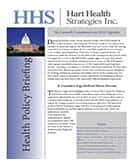Congress Returns from August Recess with Funding & Authorization Deadlines Approaching
September 11, 2023
With the House of Representatives returning this week from a month-long summer recess, lawmakers must now work to pass legislation to fund the federal government by September 30 to avoid a shutdown at the end of the fiscal year (FY). Democrats are pushing for a stopgap spending measure that extends government funding through December 8 and includes $44 billion in emergency spending. While Senate Republicans appear open to a continuing resolution (CR), the conservative House Freedom Caucus has already expressed opposition to any clean CR that does not include the Secure the Border Act, address the “unprecedented weaponization of the Justice Department and FBI,” and “end the Left’s cancerous woke policies in the Pentagon.”
Should Congress fail to extend government funding, most essential health care services – including Medicare checks and the insurance exchanges – would not be disrupted. Under the U.S. Department of Health and Human Services (HHS) contingency plan, certain COVID-19 related activities like vaccine development and authorization and clinical trials would continue through the use of 2020 and 2021 emergency appropriations. The Centers for Disease Control and Prevention (CDC) has also pledged to maintain the Vaccines for Children Program and monitoring for public health threats in the case of a shutdown. Approximately 40% of the HHS workforce, however, would be furloughed. Medicare, Medicaid, and other mandatory health program staff would be retained.
Lawmakers must also act by September 30 to reauthorize the SUPPORT Act, the Pandemic and All-Hazards Preparedness Act (PAHPA), the Children’s Hospitals Graduate Medical Education Program, the President’s Emergency Plan for AIDS Relief (PEPFAR), and to extend funding for the Community Health Centers Fund. PAHPA reauthorization was placed on the Senate legislative calendar last week, but it remains unclear when the bill could come to the floor for a vote and how it could eventually be reconciled with the legislation being considered by the House of Representatives. The House is moving two separate bills – one to fund programs at the Administration for
Strategic Preparedness and Response, and one to fund programs at the CDC. Senate Foreign Relations Chairman Bob Menendez (D-N.J.) told reporters last week that he will push to extend PEPFAR for three years, rather than the usual five years, in response to pressure from Republicans to include anti-abortion language in the reauthorization. Although his initial goal was to pass a standalone reauthorization measure, Menendez is now aiming to attach the PEPFAR extension to a larger must-pass vehicle. The House Appropriations Committee included a one-year extension of PEPFAR along with the Mexico City Policy – prohibiting non-governmental organizations from performing or promoting abortion – in its FY 2024 State and Foreign Operations spending bill, but such a measure is opposed by the Biden administration and would be unlikely to pass the Democratically-controlled Senate.
Congress is expected to try and advance wide-ranging health care legislation before the end of the year as well. The House Energy and Commerce, Ways and Means, and Education and the Workforce committees introduced bipartisan legislation on Friday focused on increasing transparency in the hospital, insurer, and pharmaceutical benefit manager industries. The Lower Costs, More Transparency Act (H.R. 5378) includes many provisions previously advanced by the panels, drawing much from the PATIENT Act, to provide patients with timelier and more accurate information about the cost of health care procedures and services. It also increases funding for community health centers and the Teaching Health Center Graduate Medical Education Program. The package is expected to be considered on the House floor sometime this month. Senate Majority Leader Chuck Schumer (D-N.Y.) has also stated his intention to bring a health care package to the floor for a vote before the end of the year.
W&Ms Seeks Comments on Health Care Disparities
House Ways and Means Committee Chairman Jason Smith (R-Mo.) is requesting stakeholder input on how to address chronic disparities in access to health care in rural and underserved communities. As a part of the request for information, Smith highlights five key areas of interest:
- Payment disparities between different geographic areas;
- The long-term financial health of providers and facilities;
- Payments for identical care provided in varying sites of service;
- Bringing new professionals into the health care workforce; and
- Innovative care models and technology to improve patient outcomes.
Comments should be submitted to [email protected] no later than October 5, 2023.
Cassidy Releases AI White Paper, HIPAA RFI
Senate Health, Education, Labor and Pensions Committee Ranking Member Bill Cassidy (R-La.) released a framework for how to regulate artificial intelligence (AI) in health care last week. Cassidy’s white paper recommends a sector- specific approach to AI regulation in order to promote competition. He also suggests the use of targeted updates to medical device regulations to maintain safety while retaining flexibility for the industry. Comments on the framework will be accepted through September 22. Senate Majority Leader Chuck Schumer (D-N.Y.) is working to develop a comprehensive framework for AI regulation, but very little details have been provided as to what this effort will entail.
Cassidy also issued a request for information (RFI) seeking input “on ways to improve the privacy protections of health data to safeguard sensitive information while balancing the need to support medical research.” Responses will be used to help inform solutions to modernize the Health Insurance Portability and Accountability Act (HIPAA). Feedback should be submitted by September 28 to [email protected].
Finance Committee Continues Organ Donation System Investigation
Members of the Senate Finance Committee have expanded their bipartisan investigation into the nation’s organ donation system. Chairman Ron Wyden (D-Ore.) and Sens. Chuck Grassley (R-Iowa), Ben Cardin (D-Md.), and Todd Young (R-Ind.) sent letters of inquiry to eight organ procurement organizations (OPOs) last week requesting information dating back to 2015 about potential conflicts of interest and about the personal financial interests and business relationships of board members and executives. “OPOs and their executives have engaged in a complex web of financial relationships with tissue processors, researchers, testing laboratories, and logistics providers, which have the potential for creating conflicts of interest. Some OPOs have also engaged in criminal activity,” the letters assert.
CMS Announces New AHEAD Payment Model
The Centers for Medicare and Medicaid Services (CMS) announced a new voluntary payment model last week that would cap doctor and hospital payments in exchange for more flexibility to coordinate care. Under the States Advancing All-Payer Health Equity Approaches and Development Model (AHEAD), eight states, which have yet to be chosen, would agree to pay hospitals a global budget in lieu of fee-for-service Medicare and Medicaid payments. The states would be provided with an overall spending target based on projections of future spending. Primary care physicians who agree to participate would receive higher payments for meeting quality measures and addressing social determinants of health. States would receive $12 million to launch the new program, which CMS aims to start in January 2026 and run for 11 years. CMS hopes the model will encourage states to move care from hospitals to less costly settings.
FDA Releases Guidances to Modernize 510(k) Program
The Food and Drug Administration (FDA) released three draft guidances last week to support efforts to strengthen and modernize the 510(k) Program:
- Best Practices for Selecting a Predicate Device to Support a Premarket Notification [510(k)] Submission
- Recommendations for the Use of Clinical Data in Premarket Notification [510(k)] Submissions
- Evidentiary Expectations for 510(k) Implant Devices
Comments on the draft guidances are due by December 6, 2023. According to the agency, the guidances are a part of the Center for Devices and Radiological Health’s work “to optimize the clarity, predictability, and consistency of the 510(k) Program as we implement the Medical Device User Fee Amendments 2022 (MDUFA V).” This work includes a new requirement that all 510(k) submissions, unless exempted, must be submitted as electronic submissions using eSTAR starting October 1, 2023. The FDA will host a webinar for stakeholders interested in learning more about these draft guidances and the agency’s ongoing efforts to modernize the 510(k) Program on October 26, 2023.
POLICY BRIEFINGS
Upcoming Congressional Hearings and Markups
Senate Committee on Homeland Security and Governmental Affairs hearing “America’s Supply Chain Security: Understanding and Mitigating Threats;” 10:15 a.m.; September 12
Senate Commerce, Science, and Transportation Subcommittee on Consumer Protection, Product Safety, and Data Security hearing to examine the need for transparency in Artificial Intelligence; 2:30 p.m.; September 12
Senate Judiciary Subcommittee on Privacy, Technology, and the Law oversight hearing to examine A.I., focusing on legislating on artificial intelligence; 2:30 p.m.; September 12
House Appropriations Subcommittee on Military Construction, Veterans Affairs, and Related Agencies oversight hearing “Department of Veterans Affairs Implementation of the Electronic Health Record Modernization Initiative;” 9:30 a.m.; September 13
House Ways and Means Committee Member Day hearing; 9:00 a.m.; September 14
Senate Committee on Homeland Security and Governmental Affairs hearing “Governing AI Through Acquisition and Procurement;” 10:00 a.m.; September 14
House Energy and Commerce Subcommittee on Health legislative hearing “Legislative Proposals to Prevent and Respond to Generic Drug Shortages;” 10:00 a.m.; September 14
House Oversight and Accountability Subcommittee on the Coronavirus Pandemic hearing “Oh Doctor, Where Art Thou? Pandemic Erosion of the Doctor-Patient Relationship;” 10:00 a.m.; September 14
House Committee on Veterans’ Affairs hearing “VA Electronic Health Record Modernization: Get Well Soon?” 10:30 a.m.; September 14
House Oversight and Accountability Subcommittee on Health Care and Financial Services hearing “The Inflation Reduction Act: A Year in Review;” 2:00 p.m.; September 14
Recently Introduced Health Legislation
H.R.5336 – To prohibit the Secretary of Health and Human Services from finalizing a rule proposed by the Centers for Medicare & Medicaid Services with respect to the determination of whether an individual is lawfully present in the United States for purposes of the eligibility of such individual for enrollment in certain health insurance programs. Sponsor: Pfluger, August [Rep.-R-TX-11]; Committees: House – Energy and Commerce; Ways and Means
S.2718 – A bill to amend title 38, United States Code, to improve matters relating to medical examinations for veterans disability compensation, and for other purposes; Sponsor: Tester, Jon [Sen.-D-MT]; Committees: Senate – Veterans’ Affairs
S.2719 – A bill to amend the Immigration and Nationality Act to provide for the reallocation of unused waivers of the foreign residency requirement for certain J-visa holders. Sponsor: Ernst, Joni [Sen.-R-IA]; Committees: Senate – Judiciary
S.2733 – A bill to address the behavioral health workforce shortages through support for peer support specialists, and for other purposes; Sponsor: Kaine, Tim [Sen.-D-VA]; Committees: Senate – Health, Education, Labor, and Pensions
S.2737 – A bill to require the Food and Drug Administration to determine whether to permit the use of enriched enrollment randomized withdrawal methodology with respect to clinical trials; Sponsor: Manchin, Joe, III [Sen.-D-WV]; Committees: Senate – Health, Education, Labor, and Pensions
S.2745 – A bill to amend title 38, United States Code, to eliminate conflicts of interest in conduct of quality management and administrative investigations by the Veterans Health Administration and to limit the detail of directors of medical centers of Department of Veterans Affairs to different positions, and for other positions; Sponsor: Peters, Gary C. [Sen.-D- MI]; Committees: Senate – Veterans’ Affairs

Hart Health Strategies provides a comprehensive newsletter on a weekly basis that recaps the previous week and previews the week ahead.

Health on the Hill provides current happenings in health care within the Federal Government and on Capitol Hill.















